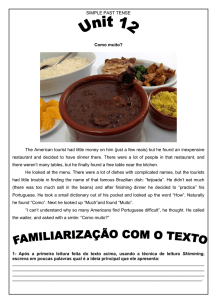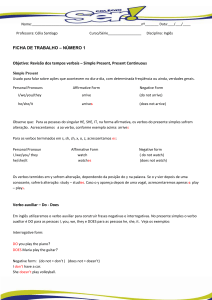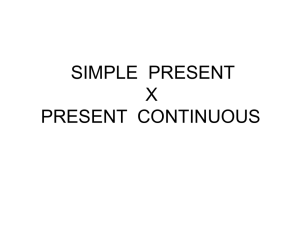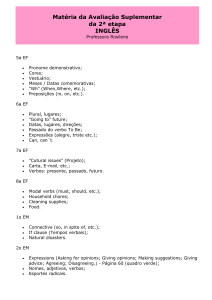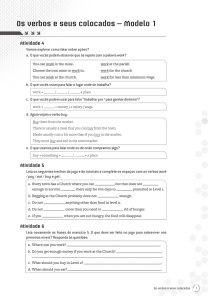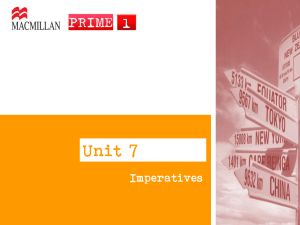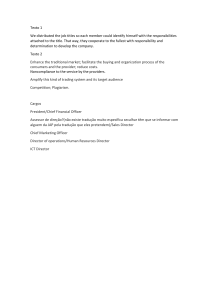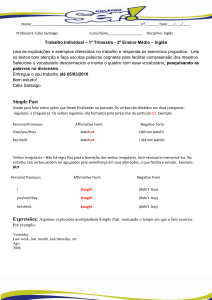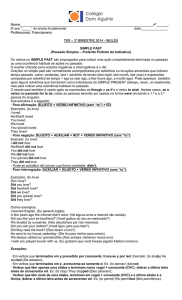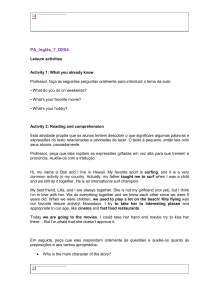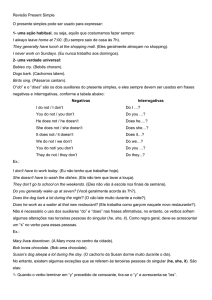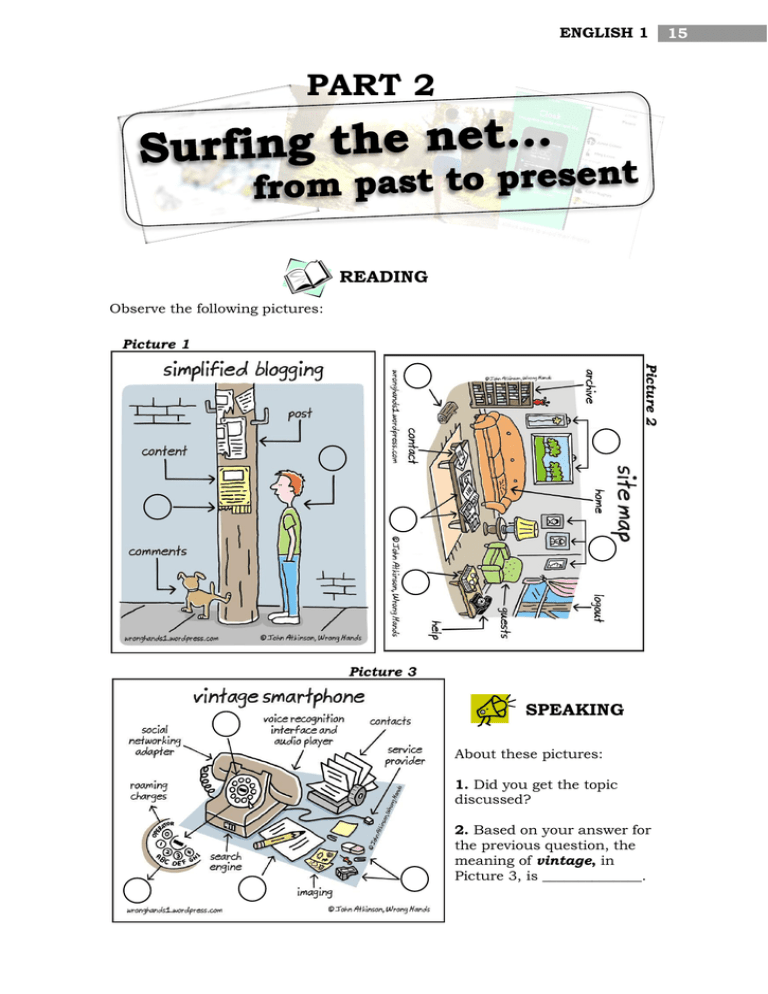
ENGLISH 1
PART 2
READING
Observe the following pictures:
Picture 1
Picture 2
Picture 3
SPEAKING
About these pictures:
1. Did you get the topic
discussed?
2. Based on your answer for
the previous question, the
meaning of vintage, in
Picture 3, is ______________.
15
16
ENGLISH 1
3. Some captions were removed from the pictures above. Based on your
previous knowledge, match the columns indicating: column 2, the meaning in
Portuguese and column 3, the picture they belong to.
Column 1
( 1 ) apps
( 2 ) shares
( 3 ) wireless messaging
( 4 ) gallery
( 5 ) follower
( 6 ) login
( 7 ) about
( 8 ) digital touch pad
( 9 ) texting
( 10 ) links
( 11 ) search
Column 2 (meaning)
( ) mensagem de texto
( ) discador
( ) entrar
( ) aplicativos
( ) conexões
( ) galeria
( ) recados
( ) sobre
( ) busca
( ) seguidores
( ) compartilhamentos
Column 3 (picture)
(____________________)
(____________________)
(____________________)
(____________________)
(____________________)
(____________________)
(____________________)
(____________________)
(____________________)
(____________________)
(____________________)
Como você deve ter observado nas figuras que analisou a pouco, elas satirizam
os modos de se relacionar da atualidade estabelecendo relações com as
tecnologias e as ferramentas do passado (vintage). Nesses termos, se fossemos
elaborar sentenças usando exemplos de cada uma das figuras, teríamos:
a. In the past we posted a message on the wall, people read and shared.
b. When we were at home and a gest arrived, we sat on the sofa and
talked about something else.
c. If we wanted to call to someone, first we found the contact in a
phonebook.
As sentenças que organizamos têm como característica o SIMPLE PAST*,
representado pelos verbos em destaque. Esse tempo designa acontecimentos
já concluídos/acabados em um tempo passado determinado, por isso é
comum encontrarmos advérbios de tempo e expressões adverbiais que são
usadas para determinar esse tempo. Veja alguns exemplos:
YESTERDAY (ontem)- Ex.: I posted a message yesterday.
LAST WEEK/MONTH/YEAR (semana passada/mês/ano passado)Ex.: I bought a smartphone last week.
We travelled to Buenos Aires last year.
… WEEKS/DAYS/YEARS AGO (... semanas/dias/anos atrás)Ex.: Fourty years ago we searched for information in a dictionary.
She shared new photos on Facebook a week ago.
IN… (Em…)- Ex.: In 2012, around 2 billion people had smartphones.
Na construção do Passado Simples em inglês DEVEMOS saber reconhecer os
dois tipos de verbos existentes: VERBOS REGULARES E VERBOS
IRREGULARES. Para formarmos o passado dos VERBOS REGULARES, de
modo geral, adicionamos as partículas –ed ou –d (nos verbos terminados em
e) ao final do verbo na forma infinitiva, como acontece em
ENGLISH 1
share
arrive
post
talk
want
shared
arrived
posted
talked
wanted
+d
+ed
Para outros verbos regulares temos casos especiais:
Verbos terminados em Y, precedidos de consoante, substituímos o y
por –ied
study
stydied
copy
ied
copied
marry
maried
Verbos terminados em consoante + vogal + consoante, dobramos a
consoante final e acrescentamos –ed
fit
stop
permit
dobra + ed
fitted
stopped
permitted
Os outros verbos destacados nas sentenças acima (read , em a; were e sat, em
b; found, em c)não seguem as mesmas regras, pois são considerados VERBOS
IRREGULARES. Para esses verbos não há uma regra geral e para
aprendermos, a menos que façamos uso contínuo deles, DEVEMOS consultar
a lista dos verbos irregulares.
FORMAS NEGATIVA E INTERROGATIVA DO SIMPLE PAST
Até então trabalhamos com sentenças na forma Afirmativa do Passado
Simples em inglês. A forma negativa é obtida pelo acréscimo do auxiliar DID
+ NOT, ou a contração DIDN’T (marca de informalidade e oralidade)antes do
verbo. Já para formarmos uma sentença interrogativa, deslocamos o auxiliar
DID para o início (antes do sujeito). Em ambas as formas o verbo volta para
sua forma infinitiva (sem –ed/-d/ied para os verbos regulares e, para os
irregulares, usamos a forma descrita na primeira coluna da lista dos verbos
irregulares).
Complete o quadro abaixo com as formas do SIMPLE PAST usando os verbos
entre parênteses indicados para cada pronome:
Pronoun/Verb
I (buy)
AFFIRMATIVE
FORMS
NEGATIVE
INTERROGATIVE
You (work)
He (make)
She (read)
It (be)
We (teach)
They (write)
*Fontes: LEECH; SVARTVIK (1994, p.68); DICIONÁRIO Oxford (2007, p.300); Upgrade,
v. 1 (p. 65-66); SILVA et. al. (2012, p. 53)
17
18
ENGLISH 1
PRACTICING GRAMMAR
1. Write sentences in the Simple Past using each verb of the chart below (you
can write affirmative, negative or interrogative sentences).
a) (buy) _________________________________________________________________
b) (work) _________________________________________________________________
c) (make) _________________________________________________________________
d) (read) _________________________________________________________________
e) (be) _________________________________________________________________
f) (teach) _________________________________________________________________
g) (write) _________________________________________________________________
2. Fill the blanks with Simple Past forms. (Pay attention to regular and
irregular verbs).
a) Sara _____________________ a film yesterday. (to watch)
b) The car ____________________ at the traffic light. (to stop)
c) Andy _______________________ a new shirt two days ago. (to buy)
d) They __________________________ what the teacher ___________________.
(not/to understand/to say)
e) _______________ she _________________ a cake? (not/to make)
f) Last week we ______________________ to school by bus. (to go)
g) _______________ he __________________ a house? (to build)
Adapted from http://www.englisch-hilfen.de/en/exercises_list/zeitformen.htm
3. Analyze the picture and the assertions:
I.
II.
III.
IV.
O verbo told é irregular e, como o verbo
read, é igual no presente e no passado.
O verbo was é a forma passada do verbo
to be.
O humor da tira reside no fato de os
pássaros estarem falando.
A tira apresenta uma crítica aos maus
tratos com animais.
Está correta
a) apenas I
b) apenas II
c) apenas III
d) apenas IV
I told you Botox was for humans.
ENGLISH 1
LISTENING
The following activities are based on Audios 1 and 2. Listen to them and
answer the questions.
AUDIO 1: TEHNOLOGY
(Retrieved from http://www.listenaminute.com/t/technology.html)
1. In the beginning of the audio, the speaker makes two questions. These
questions are…
a) Where we do without technology? Would we still be living in caves?
b) What would we do without technology? Would we still be living in caves?
c) What would we do without technology? Who we still be living in caves?
2. Complete the fragment.
I think there are two main kinds of _________________. The kinds before and
after ____________________. _________ we think about technology before
computers, it was quite ______________. It was all _________________. Things
like steam trains and fridges. At the time, that (be – past) _________ cutting
edge technology. But, today’s technology is really cutting edge. ______’s the
kind of technology that is out of date as soon as it hits the shelves. I
______________ this.
3. According to the audio, the speaker thinks “[…] so _________seeing it all
happen”, and he loves _______________ about technology of the ____________
“and then ___________ it a few years later.”
The alternative that fills the gaps is
a) exacting; listening; future; life
b) exalting; writing; future; like
c) exciting; reading; future; buy
4. Following the idea of “technology of the future”, the speaker talks about a
kind of movie that always is presenting new technological tools. This kind of
movie is
a) science fiction
b) science thriller
c) science action
5. And, as a character of a _________________________ movie, the speaker ends
his speech by saying that he “would love to live to be ________” to see how
much technology will evolve.
a) 100
b) 200
c) 300
AUDIO 2: MOBILE PHONES
(Retrieved from http://www.listenaminute.com/m/mobile_phones.html)
6. “How important to you is your mobile phone? Do you really need it?”. By
these questions the speaker starts his speech about mobile phones. After that
he presents a decade in which mobiles didn’t exist. It was in the…
a) 1918s
b) 1980s
c) 1988s
19
20
ENGLISH 1
7. According to the speaker during this decade people used phone for _____
and “there was _________________ on every street corner.”
a) talking with family, friends and pay bills – telephone log
b) talking with family, friends and be busy – telephone cab
c) talking with family, friends and do business – telephone box
8. The speaker comments that he is not sure “whether mobile phones are a
good or a bad thing”. In this respect he complains that…
“For sure, they are very _______________, but they can also be a
_______________. There’s nothing worse than talking to someone and then they
ignore you for ______ minutes while they answer their phone. I have even seen
people on a date and one person chats on the phone for _________ minutes.”
9. In the end the speaker questions: “How would life change for you if you
didn’t have a mobile?” Give your opinion in a short paragraph.
_____________________________________________________________________________
_____________________________________________________________________________
_______________________________________________________________________
READING and
WRITING
1. A partir do título do texto, como você explicaria a expressão “Antisocial
network”?
____________________________________________________________________________
2. Em sua opinião qual seria a causa desse comportamento?
_____________________________________________________________________________
_____________________________________________________________________________
3. O texto que leremos a seguir tratará desse tema, mas antes vamos
identificar algumas informações sobre ele:
Onde ele foi publicado? _____________________________________________________
Qual é a evidência? _________________________________________________________
Quando ele foi publicado? ___________________________________________________
Quem é o autor? ___________________________________________________________
Onde/Para quem ele trabalha? _____________________________________________
O que você sabe sobre esse “local”? _________________________________________
Qual é o público alvo desse texto? __________________________________________
Que tipo de texto é esse?
( ) descritivo
( ) injuntivo
( ) informativo
( ) dissertativo
( ) reportagem
( ) tutorial
A que gênero textual ele pertence?
( ) propaganda
( ) notícia
Qual é o objetivo do texto? _________________________________________________
4. Para realizar a leitura do texto, adote os seguintes procedimentos:
Sublinhe as palavras conhecidas ou parecidas com o português;
Circule as que você não conhece;
Tente relacionar o assunto do texto com seu conhecimento prévio.
ENGLISH 1
Antisocial networks: how to avoid Facebook 'friends'
and irritate people
New apps and sites let users keep a distance and stop technology intruding into their lives
Think that Facebook, Twitter,
Instagram and their ilk are out of
control, and you would like to
regain some of the privacy you
once enjoyed? Help may be at
hand in the form of "antisocial
networking"
–
a
clutch
of
newapps and websites designed to
hide you from the seemingly
irresistible march of technological
intrusion.
Cloak allows users to avoid their ‘friends’.
Proudly billing itself as "the antisocial network", Cloak works by turning social
media against itself, mining real-time geographical location data from Facebook, Twitter,
Instagram and Foursquare accounts to warn you if your "friends" are nearby. This enables
you to take a different route and avoid meeting them. While it may be of particular use to
cheating spouses, its creators insist that its purpose is broad: "Avoid exes, co-workers, that
guy who likes to stop and chat, anyone you'd rather not run into," it says.
I think that the age of mass social networking has reached its peak, at least for us firstworlders," said Cloak's co-creator Chris Baker, who also founded the hugely successful
viral news platform Buzzfeed . "Platforms like Facebook and Twitter are public arenas
where we cultivate versions of ourselves that are well-manicured, mostly false, and always
'on'. I think that is what's beginning to wane. We're exhausted from it and by it. Now
platforms that enable ephemeral, private and very loose moments are starting to become
hugely mainstream. Antisocial stuff is on the rise. Social has had its moment in the sun.
Now people are beginning to revolt."
Last year the American writer Jonathan Franzen bemoaned the omnipresence of social
networking which forces us to interact constantly with others, rather than spending time in
our own thoughts. "Who has time to read literature when there are so many blogs to keep
up with, so many food fights to follow on Twitter?" he asked in a book, The Kraus Project.
There is evidence that Facebook and Twitter make many of us unhappy as they push us to
maintain an unrealistically positive public persona. A recent University of London study
explained: "The public nature of a user's Facebook profile means that users' social lives are
particularly open to scrutiny from others." And the network can even break up relationships:
"Site use can lead to increased jealousy and/or obsessive behaviour, as a result of the
opportunities it provides users to access … information about their partner that would not
otherwise be accessible."
Adapted from http://www.theguardian.com/media/2014/jun/01/antisocial-networks-social-media-privatethoughts-apps-distance-online-friends-technology
21
ENGLISH 1
22
GLOSSARY
ilk: laia, tipo
regain: recuperar
clutch: último recurso
hide: esconder
seemingly: aparentemente proudly: orgulhosamente billing: faturamento exes: ex
mining: minar/proteger nearby: próximos cheating: trapacear
spouse: esposa
peak: pico/máximo
hugely: imenso
to wane: declinar
jealousy: ciúme
mainstrean: domínio
stuff: coisas bemoaned: reclamou/lastimou own: próprio
spending: gastando food fight: guerra de comida behavior: comportamento
5. Com base no título, no lead (frase abaixo do título) e no primeiro parágrafo
do
texto,
podemos
afirmar
que
o
assunto
abordado
é/são
____________________________________________________________________________
6. De acordo com os segundo parágrafo do texto, o nome do aplicativo
desenvolvido é __________________ e o seu criador comenta que o sistema pode
ter inúmeras utilidades. Ele cita algumas delas, entre elas uma de uso
particular.
a) Qual é a utilidade de uso particular do app? _______________________________
____________________________________________________________________________
b) Quais as outras utilidades mais abrangentes do app? _____________________
____________________________________________________________________________
7. No terceiro parágrafo, o autor traz a opinião de Chris Baker, um dos
criadores do app, a respeito do momento atual das redes sociais. Em seu
depoimento ele utiliza algumas expressões que buscam definir esse momento e
o perfil dos usuários. Relacione as expressões do texto com suas
possibilidades de significado em português.
(
(
(
(
)
)
)
)
first-worlders
well-manicured
‘on’
ephemeral
(
(
(
(
)
)
)
)
interessante/feliz
passageiro/fugaz
iniciados/experientes
bem cuidado
8. Ainda com base no terceiro parágrafo, o que Chris Baker pensa a respeito
do fenômeno chamado de “antissocial networking”?
_____________________________________________________________________________
_____________________________________________________________________________
____________________________________________________________________________
9. No quarto parágrafo encontramos a pergunta "Who has time to read
literature when there are so many blogs to keep up with, so many food fights to
follow on Twitter?" , feita pelo escritor Americano Jonathan Franzen. Que
resposta você daria sobre o problema levantado pelo autor? Você concorda
com ele?
_____________________________________________________________________________
_____________________________________________________________________________
_____________________________________________________________________________
____________________________________________________________________________
10. No último parágrafo, o autor ressalta duas consequências das redes sócias
no comportamento dos usuários, que são _________________________________ e
__________________________________________. Da mesma forma, destaca o
resultado de um estudo da Universidade de Londres que mostra que o perfil
dos usuários do Facebook é _______________________________________________.
Isso, segundo o estudo, em muitos casos pode levar a/ao ___________________
__________________________, em consequência das ___________________________
___________________________________________________________________________.
ENGLISH 1
Observe as sentenças a seguir, retiradas do texto:
1. Proudly billing itself as "the antisocial network […]
2. "Platforms like Facebook and Twitter are public arenas where we cultivate
versions of ourselves that are well-manicured […]
3. "Who has time to read literature when there are so many blogs to
keep up with, so many food fights to follow on Twitter?"
4. There is evidence that Facebook […] make many of us unhappy […]
As palavras destacadas nas sentenças 1 e 2 são chamadas de REFLEXIVE
PRONOUNS. Esses pronomes são usados para indicar que a ação foi realizada
pelo próprio sujeito e têm como característica a presença das terminações –
self (no singular) e –selves (no plural), que significam próprio(a), mesmo(a), de
si mesmo(a), autorretrato.
Algumas funções do pronomes reflexivos são:
Enfatizar a pessoa que realizou a ação:
Ex: He created the app himself. (Ele mesmo criou o aplicativo)
Quando precedidos da preposição by significam sozinho(a):
Ex: I never feel by myself on Face. (Nunca me sinto sozinho no Face).
Complete o quadro a seguir com o significado dos pronomes reflexivos:
PERSONAL
I
you
he
she
it
we
you
they
REFLEXIVE
myself
yourself
himself
herself
itself
ourselves
yourselves
themselves
TRANSLATION
a si mesmo(a), ele mesmo, ela mesma, -se
Já os verbos destacados nas sentenças 3 e 4, equivalem ao verbo
HAVER/EXISTIR* do português, ou seja, THERE IS (há/existe) para o
singular e THERE ARE (há/existem) para o plural. O verbo haver em inglês é
formado pela combinação THERE + TO BE (no presente, no passado e no
futuro). Para a forma negativa, acrescentamos NOT ao verbo TO BE e para a
forma interrogativa deslocamos o verbo TO BE para o início da sentença.
FORMS
AFFIRMATIVE
NEGATIVE
INTERROGATIVE
There is a book on the
table. (Há um livro sobre a
mesa)
There are three books on
the table. (Há três livros
sobre a mesa)
* IMPORTANTE: Em português, no dia a dia, usamos o verbo “ter” ao invés de “haver”
para falar que existe alguma coisa. Em inglês ISSO NÃO ACONTECE:
HAVER = THERE IS/THERE ARE
≠
TER = HAS/HAVE
Fonte: http://www.solinguainglesa.com.br/conteudo/pronomes3.php
23
24
ENGLISH 1
PRACTICING GRAMMAR
1. Choose the adequate reflexive pronoun to complete the sentences.
a) The girl was looking at _________ in the mirror. ( ) herself
( ) myself
b) My boyfriend and I were cheating _________. ( ) ourselves ( ) themselves
c) I made a cake _________. ( ) myself
( ) itself
d) Peter can’t do the activities by _______. ( ) herself
e) My dog sometimes bites ________. ( ) himself
( ) himself
( ) itself
f) The students organized a party __________. ( ) ourselves ( ) themselves
g) My mother always talks to ________. ( ) yourself
( ) herself
2. The verb THERE + TO BE is also used to describe things, for example,
furniture (mobiliário de uma casa). Take a look on the image below and
complete the dialogues using THERE IS or THERE ARE.
A: ___________ a flower on the
coffee table?
B: No, _____________. On the
coffee table ______________
some magazines.
A: Oh, you are right. _________
a flower on the bookcase.
C: Excuse, but ______________
some photos on the wall?
D: Yes, _______________. And
also
_______________
two
pictures over the sofa.
C: _______________ something
behind the green armchair?
D: Sorry, I don’t know.
As palavras destacadas nos diálogos acima são preposições que indicam
lugar, em inglês PREPOSITIONS OF SPACE. As principais preposições de
lugar estão representadas nas figuras a seguir:
Z
on: _______
in: ________
in front of: _________
over: _______
near: _________
under: _____
next to: _________
behind: ________
between: ________
ENGLISH 1
3. Now, considering the image of exercise 2, complete the sentences with the
adequate preposition of space.
trunk: tronco
lamp: abajur
rug: tapete
glass: vidraça
curtain: cortina
picture: quadro
a) The wooden trunk is __________________ the bookcase.
b) There is a flower picture _____________ the wood picture.
c) The phone set is ________________ the table.
d) There are many books _________________ the bookcase.
e) The lamp is _________________ the armchair.
f) The rug is __________________ the coffee table.
g) Grandpa picture is __________________ Peter and Robert’s pictures.
h) There is a glass ____________________ the curtain.
READING
Read some comments people posted on The Observer page related to the topic
“antisocial network: apps to stop intrusion on people’s lives”.
If you need to app to stop technology intruding into your life, you need to take a
long hard look at yourself
Agreed. I’m not on Facebook, Twitter or Instagram. I have about 5 great
friends I see on a regular basis. I don’t need 500 friends, it sounds too
much like hard work and no quality time
That’s a very simplistic attitude. You do realized that you – yes YOU – are
being tracked and monitored merely by reading this page. Like most sites
on the internet, it is riddled with ridden trackers generated by invisible
affiliates and advertisers. You are being profiled all the time, and you likely
don’t even know it. Your life is being intruded upon by technology in a very
big way by unscrupulous corporations. It is possible to set your browser to
indicate that you do not wish to be tracked. But guess what? They almost
always deliberately ignore that setting, because they are not compelled to
do so.
25
26
ENGLISH 1
GLOSSARY
into: para dentro
hard: profundamente, atentamente, forte
too much: demais, demasiado
regular basis: com frequência
sounds: soa, parece
realised: dar-se conta
tracked: rastreado
merely: apenas, somente
riddled: cheio de
ridden: escondido
advertisers: anunciantes
profiled: catalogado, identificado
likely: provavelmente
unscrupulous: desonesto
wish: desejar
browser: computador
guess: supor, achar
almost: quase
deliberately: deliberadamente setting: situação compelled: preocupado
1. Em relação ao texto podemos afirmar que
I.
Theodorus é favorável ao uso de Apps para impedir que pessoas
intrusas acessem nossos dados pessoais na rede.
II.
Para PeteSaman ter poucos amigos significa menos trabalho e maior
qualidade nas relações pessoais.
III.
Segundo blipvert, ter poucos amigos ou estar fora das redes sociais não
impede que sejamos monitorados, pois basta acessarmos um site
qualquer para sermos imediatamente catalogados pela rede.
Estão corretas:
a) I e II
b) II e III
c) I e III
d) I, II e III
WRITING
2. And what about you... What is your opinion about these three comments?
Who do you agree or disagree with?
Nick: ________________________
Date: _______________________
Time:________
___________________________________________________________________
___________________________________________________________________
___________________________________________________________________
___________________________________________________________________
___________________________________________________________________
___________________________________________________________________
Considere os fragmentos retirados dos comentários de PeteSaman e blipvert:
“I have about 5 great friends I see on a regular basis. I don’t need 500
friends, it sounds too much like hard work and no quality time.”
ENGLISH 1
“They almost always deliberately ignore that setting, because they are
not compelled to do so.”
Nos fragmentos, os verbos destacados (em negrito) estão no SIMPLE
PRESENT, ou seja, designam, entre outas coisas, fatos permanentes, ações
habituais, verdades universais. A exemplo dos fragmentos acima, para relatar
ações habituais, geralmente, usamos advérbios de frequência (FREQUENCY
ADVERBS) ou expressões temporais que descrevem o número de ocorrências
de um evento ou habito (sublinhadas: on a regular basis – always). Podemos
representar esses advérbios em um contínuo de ocorrência, desde os mais
frequentes até os menos frequentes. Vamos organizar os advérbios do quadro
no contínuo a seguir e depois identifica-los em português.
sometimes – always – never – hardly ever – usually – often
-
+
__________
___________
___________
___________
__________
___________
FORMA AFIRMATIVA DO PRESENT PERFECT
Para organizarmos sentenças afirmativas no Presente Simples, mantemos o
verbo na forma infinitiva SEM TO em I, you, we e they. Veja alguns
exemplos:
TO HAVE – I have about 5 great friends. (Eu tenho apenas 5 bons amigos)
TO NEED – You need to look at yourself. (Você precisa olhar para si mesmo)
TO KNOW – We know that sites monitor ourselves. (Nós sabemos que os sites
nos monitoram)
TO IGNORE – They ignore our privacy. (Eles ignoram nossa privacidade)
Com as terceiras pessoas do singular (he, she, it), na maioria dos casos,
acrescentamos “s” ao verbo. Exemplos:
TO PLAY – He plays games online. (Ele joga games na internet)
TO LOVE – She loves to chat on Facebook. (Ela ama conversar pelo Facebook)
TO SOUND – It sounds too much like hard work and no quality time. (Isso
exige muito trabalho e pouca qualidade)
Ainda nas terceiras pessoas do singular, temos alguns verbos em que a forma
afirmativa é feita de modo especial:
Verbos terminados em SH, CH, SS, X, O ou Z, acrescentamos ES:
TO WATCH – She watches TV Series every days.
TO FIX – The man fixes umbrellas for at least R$ 7,00.
Verbos terminados em Y precedido de consoante eliminamos o Y e
acrescentamos IES:
TO STUDY – He studies Math every Thursdays morning.
TO COPY – She always copies the answers from the blackboard.
27
28
ENGLISH 1
FORMAS NEGATIVA E INTERROGATIVA DO SIMPLE PRESENT
A exemplo do Simple Past, para formarmos sentenças negativas e
interrogativas no Simple Present também precisamos de verbos auxiliares. Os
auxiliares desse tempo são DO (I, you, we, they) e DOES (he, she, it).
A forma negativa é dada pela adição do NOT aos auxiliares DO/DOES (DO
NOT/DON’T – DOES NOT/DOESN’T). Para a forma interrogativa, deslocamos
os auxiliares DO/DOES para início da sentença.Em ambas as formas, nas
terceiras pessoas do singular, o verbo volta para a forma infinitiva, ou seja,
perde o “-s”, “-es” ou “-ies”.
Ex: She loves to chat on Facebook.
She doesn’t love to chat on Facebook.
Does she love to chat on Facebook?
Complete o quadro a seguir com as formas SIMPLE PRESENT usando os
verbos nos parênteses para cada pronome:
Pronoun/Verb
I (make)
AFFIRMATIVE
FORMS
NEGATIVE
INTERROGATIVE
You (hold)
He (play)
She (fly)
It (be)
We (teach)
You (write)
They (run)
PRACTICING GRAMMAR
1. Fill the gaps by putting the verbs in parenthesis into the affirmative form of
Simple Present.
a) Every Monday, Sally (to drive) _______________ her kids to football practice.
b) I hate living in Santa Maria during the winter because it (to rain, always)
__________________________.
c) This delicious chocolate (to be) __________ made by a small chocolatier in
Zurich, Switzerland.
d) Tim and Pat (to send) ___________text messages.
e) The dog (to run) ______________ out of the house.
f) She (to bake) _________ cookies twice a month.
g) Martha and Kevin (to swim) ___________once a week.
ENGLISH 1
2. Consider the frequency adverbs and everyday actions in the box.
often – do the English exercises – always – eat chocolate – hardly
ever – access my Face – hang out with friends – go to school –
sometimes usually – read a book – listen to music – never
Write sentences about yourself using the words in the box.
_____________________________________________________________________________
_____________________________________________________________________________
_____________________________________________________________________________
_____________________________________________________________________________
_____________________________________________________________________________
_____________________________________________________________________________
3. Complete the fragment below using the correct form of verbs in parenthesis.
Hi. My name (be) ____ Albert. My friends (call) _________ me Al. You can call me
Al if you (like) _______.
I (want) _______to tell you about a problem I (have) ______. It (be, not) ______ a
big problem, but it is not a small problem either. I (guess) __________ it's
somewhere between big and small.
I (have)__________ a best friend. His name (be) _______ Joe. But everybody (call)
_________him Joey. Joey and I have been friends for a long time. That's the
problem. Joey (like) _________ to smoke. He (say) _______ he (do, not) _________,
but I (know) _________he (do) ___________. He (try) __________ to hide it from
me, but I (see) ___________ him do it sometimes. When I see him do it, he just
(laugh) ___________ and (walk) __________ away.
Now, Joey (smoke) _____________ everyday. When he (come) ____________ over
to my house, he (always, bring) ____________________________ his cigarettes
with him. He (keep) _____________ them in his pocket. He (think)
____________ they are cool. He (not, think) ___________________ it's a bad idea to
smoke. He (say)___________: "(not, worry) ____________________ Al. I'm okay." He
(tell) _____________ me that I (not, understand) ___________________, but I
(think) _________ I (do) _______________.
I (feel) ______________ like it's his right to smoke. He can do what he (want)
__________ to do, right? He's free to make his own choices. But I (can, not)
_________ help it. I (care) _________________ about him too much. I (be worried)
_____________________ about him. He's my best friend. Remember?
Anyway, I (not, want) ___________________ to bother you anymore with my
problem. After all, it is not a big problem. But it (be, not) ______________ a
small problem either.
Fonte: http://englishmaven.org/HP6/Present%20Tense%20Exercise%2013.htm
29
30
ENGLISH 1
(ENEM, 2010)
THE DEATH OF THE PC
The days of paying for costly software upgrades are numbered. The PC will
soon be obsolete. And BusinessWeek reports 70% of Americans are already
using the technology that will replace it. Merrill Lynch calls it “a $160 billion
tsunami”. Computing giants including IBM, Yahoo!, and Amazon are racing to
be the first to cash in on this PC-killing revolution.
Yet, two little-known companies have a huge head start. Gets their names in a
free report from The Motley Fool called, “The Two Words Bill Gates Doesn’t
Want You to Hear…”
Click here for instant access to this FREE report!
BROUGHT TO YOU BY THE MOTLEY FOOL
Disponível em http://www.fool.com. Acesso em: 21 jul. 2010.
Ao optar por ler a reportagem completa sobre o assunto anunciado, tem-se
acesso a duas palavras que Bill Gates não quer que o leitor conheça e que se
referem
a) aos responsáveis pela divulgação desta informação na internet.
b) às marcas mais importantes de microcomputadores do mercado.
c) aos nomes dos americanos que inventaram a suposta tecnologia.
d) aos sites da internet pelos quais o produto já pode ser conhecido.
e) às empresas que levam vantagem para serem suas concorrentes.
Os fragmentos destacados no texto da questão do ENEM caracterizam um
tempo que, em inglês, chamamos de CONTINUOUS ou PROGRESSIVE. As
frases do texto estão no PRESENT CONTINUOUS e indicam ações que estão
ocorrendo por um determinado período de tempo (atualmente). Se
passássemos essas frases para o passado, teríamos o PAST CONTINUOUS e
elas passariam a expressar ações que estavam em progresso em um
determinado período no passado. Veja nos exemplos como isso acontece e qual
a estrutura desses tempos:
PRESENT CONTINUOUS
are
The groups
TO BE no Presente
racing
Verbo principal + ing
to be the first to […]
PAST CONTINUOUS
were
The groups
TO BE no Passado
racing
Verbo principal + ing
to be the first to [...]
ENGLISH 1
PRESENT CONTINUOUS
is
Yahoo
TO BE no Presente
racing
Verbo principal + ing
to be the first to […]
PAST CONTINUOUS
was
Yahoo
TO BE no Passado
racing
Verbo principal + ing
to be the first to [...]
FORMAÇÃO DO VERBO PRINCIPAL E EXPRESSÕES DE TEMPO
Verbos terminados em “e”, eliminamos o e e acrescentamos –ing:
Ex: ride – riding , write – writing ; make – making
Verbos terminados em consoante + vogal + consoante, dobramos a
ultima consoante e acrescentamos –ing:
Ex: put – putting ; cut – cutting ; begin – beginning
Sentenças no Present Continuous, geralmente, vem acompanhas de
advérbios ou expressões de tempo, como now (agora), at the moment
(no momento), nowadays (atualmente), etc.
Sentenças no Past Continuous, geralmente, são acompanhadas de
advérbios ou expressões de tempo, tais como yesterday (ontem), while
(enquanto),
when
(quando),
day/week/month/year
ago
(dia/semana/mês/ano atrás, passado/a), before (antes), after (depois),
etc.
Verbos que expressam estados, sentidos e sentimentos NÃO são,
normalmente, utilizados na forma do continuous: understand
(entender), feel (sentir), hear (ouvir), smell (sentir), taste (provar),
believe (acreditar), know (conhecer, saber), like (gostar), love (amar),
want (querer), wish (desejar), need (necessitar), forget (esquecer), etc.
FORMAS NEGATIVA E INTERROGATIVA DO CONTINUOUS
Para formarmos a negação no PRESENT CONTINUOUS e no PAST
CONTINUOUS adicionamos NOT ao verbo TO BE (IS NOT/ISN’T; ARE
NOT/AREN’T – no presente e WAS NOT/WASN’T; WERE NOT/WEREN’T – no
passado).
She isn’t working today
She wasn’t working yesterday.
We aren’t watching TV now.
We weren’t watching TV last night.
Para fazermos perguntas, tanto no PRESENT quanto no PAST CONTINUOUS,
deslocamos o verbo TO BE para o início da sentença. Para respondermos
usamos respostas curtas (Yes/No questions).
Is she working today? Yes, she is./ No, she isn’t.
Was she working yesterday? Yes, she was./No, she wasn’t.
Are they watching TV now? Yes, they were./No, they weren´t.
Were they watching TV last night? Yes, they are./No, they weren’t.
31
32
ENGLISH 1
PRACTICING GRAMMAR
1. Fill the gaps using the verbs in present or past continuous forms.
a) I _________________________ letters all day yesterday.
(write)
b) She ________________________________ to me all week.
(no, speak)
c) ____________ you _________________ TV when it happened?
(watch)
d) It ___________________________ for long yesterday afternoon.
(rain)
e) While you stopped the car __________ he _____________ on the street?
(run)
f) When they called me I ____________________________. Bless u God!
(no, drive)
g) At the moment he ______________________ dinner.
(have)
h) _________ Pedro ________________ at the sofa now?
(sleep)
i) When do you ____________________________ your vacation?
(start)
j) I think they _________________________ their lunch right now.
(not, eat)
k) My sister __________________________ Spanish for traveling.
(learn)
l) People, nowadays, __________________________ too much. It’s good!
(not, drink)
LISTENING
The following activities are based on the audio “Mike’s description about his
routine”,
retrieved
and
adapted
from
http://www.elllo.org/english/Games/G048DayRecap.htm.
1. Along the audio Mike presents some activities about his day. Listen to the
audio and match each activity to the correspondent part of the day in which it
was accomplished: in the morning (1), in the afternoon (2) or at night (3).
(Pay attention to keywords along the audio).
ENGLISH 1
( 1 ) in the morning
( 2 ) in the afternoon
( 3 ) in the evening/at night
(
(
(
(
(
(
)
)
)
)
)
)
go shopping
read a book
clean the apartment
jogging
go to the cinema
have lunch
2. In the beginning of the audio, Mike says that de does not like jogging, but
he knows that it is important for his health. For this reason, how many times
does he practice this activity?
( ) three or four times every weekday
( ) three or four times every weekend
( ) three or four times every week
3.
(
(
(
According to Mike, after jogging …
) he went home, took a shower and cleaned his apartment
) he went home, took a shower and had a cup of coffee
) he went home, took a shower and went shopping
4. Mike indicates that he never eats one of the meals. What meal does he
never eat?
( ) breakfast
( ) lunch
( ) snack
(
) dinner
5. Because of that he said that he was really hungry. So, what did he eat in a
restaurant?
( ) double cheeseburgers and double fries
( ) double cheeseburgers, fries and salad
( ) double cheeseburgers and fries
6. He said that in the afternoon he went shopping with a friend of his. What
did Mike buy and why?
(
) he bought some t-shirts and a pair of shoes for work because everything
was on sale
(
) he bought some shirts, socks and a pair of shoes for work because he
likes spend money
(
) he bought some shirts and a pair of shoes for work because everything
was on sale
7. Later, in the evening, he said that he saw a movie. What movie did he
watch?
( ) The Butterfly Effect movie
( ) The New Batman movie
( ) The Bad Boys movie
8. What was his opinion about the movie?
( ) he didn’t like the movie, but the visual effects were amazing and the story
was interesting
(
) he liked the movie because he lives Superheroes and the visual effects
and the story were amazing
( ) he liked the movie because the visual effects were amazing and the story
was interesting, but he doesn’t like Superheroes.
9.
(
(
(
At night, after the movie, he…
) said good bye to his girlfriend, relaxed and had a cup of coffee
) said good bye to his girlfriend, relaxed and read a book
) said good bye to his girlfriend, relaxed and took a shower
33
IRREGULAR VERBS LIST
Present Tense
Simple Past
Past Participle
Tradução
be
was
been
ser; estar
become
became
become
tornar-se
begin
began
begun
começar
break
broke
broken
quebrar
bring
brought
brought
trazer
build
built
built
construir
burn
burnt
burnt
queimar
buy
bought
bougth
comprar
catch
caught
caught
pegar; capturar
choose
chose
chosen
escolher
come
came
come
vir
cost
cost
cost
custar
cut
cut
cut
cortar
do
did
done
fazer
draw
drew
drawn
desenhar
dream
dreamt
dreamt
sonhar
drink
drank
drunk (en)
beber
drive
drove
driven
dirigir
eat
ate
eaten
comer
fall
fell
fallen
cair
feed
fed
fed
alimentar
feel
felt
felt
sentir
fight
fought
fought
lutar
find
found
found
achar
fly
flew
flown
voar
forget
forgot
forgotten
esquecer
forgive
forgave
forgiven
perdoar
get
got
got
receber
give
gave
given
dar
go
went
gone
ir
grow
grew
grown
crescer
have
had
had
ter
hear
heard
heard
escutar
hide
hid
hidden/hid
esconder-se
hit
hit
hit
bater
hold
held
held
segurar
hurt
hurt
hurt
ferir
keep
kept
kept
guardar
know
knew
known
saber
lay
laid
laid
deitar
lead
led
led
guiar
learn
learnt
learnt
aprender
leave
left
left
partir
lend
lent
lent
emprestar
let
let
let
deixar
lie
lay
lain
mentir
light
lit
lit
clarear
lose
lost
lost
perder
make
made
made
fazer
meet
met
met
encontrar
melt
melted
molten
derreter
pay
paid
paid
pagar
put
put
put
colocar
read
read
read
ler
ride
rode
ridden
cavalgar
rise
rose
risen
levantar
run
ran
run
correr
saw
sawed
sawn
serrar
say
said
said
dizer
see
saw
seen
ver
sell
sold
sold
vender
send
sent
sent
enviar
set
set
set
arrumar
show
showed
shown
mostrar
sing
sang
sung
cantar
sleep
slept
slept
dormir
smell
smelt
smelt
cheirar
speak
spoke
spoken
falar
spell
spelt
spelt
soletrar
spend
spent
spent
gastar
swim
swam
swum
nadar
swing
swung
swung
balançar
take
took
taken
pegar; tirar
teach
taught
taught
ensinar
tear
tore
torn
chorar
tell
told
told
contar
think
thought
thought
pensar
understand
understood
understood
entender
wake
woke
waked
acordar
wear
wore
worn
vestir
win
won
won
vencer; ganhar
write
wrote
written
escrever

